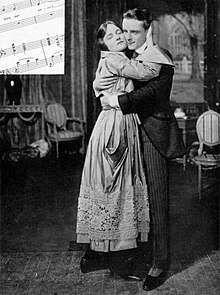Maytime (musical)
Maytime is a musical with music by Sigmund Romberg and lyrics and book by Rida Johnson Young, and with additional lyrics by Cyrus Wood. The story is based on the 1913 German operetta Wie einst im Mai (Like Once in May), composed by Walter Kollo, with words by Rudolf Bernauer and Rudolph Schanzer. The story, set in New York, is told in episodes covering a long period, from 1840 to the 20th century. Wealthy young Ottillie is in love with Dick, but they are kept apart by family and circumstance. Years later, their descendants marry. Maytime introduced songs such as "The Road to Paradise", "Will You Remember?" and "Jump Jim Crow".
| Maytime | |
|---|---|
 Peggy Wood and Charles Purcell in the original Broadway production of Maytime | |
| Music | Sigmund Romberg |
| Lyrics | Rida Johnson Young |
| Book | Rida Johnson Young |
| Basis | Wie einst im Mai (German operetta). |
| Productions | 1917 Broadway |
The musical ran on Broadway from 1917 to 1918. It was the second longest-running book musical in the 1910s, and it established Romberg as one of the leading creators of operettas.
Plot summary
The beautiful Ottilie van Zandt is the daughter of a wealthy colonel who owns a cooperage. She loves Richard "Dick" Wayne, the son of her father's foreman, but her father wishes her to marry her cousin, a drunken libertine. Dick travels and becomes a success, but when he returns, he finds his beloved betrothed, and so he marries another woman. After many years, both are single again, but they are never able to consummate their love. Dick saves Ottilie from bankruptcy by purchasing her home before she is evicted. Still later, the couple's grandchildren meet and marry happily.
Productions
The original Broadway production opened at the Shubert Theatre on August 16, 1917, and later moved to the 44th Street, Broadhurst and Lyric Theatres, running for a total of 492 performances.[1] It starred Peggy Wood and Charles Purcell and featured Ralph Herbert, William Norris and Gertrude Vanderbilt. The New York Times gave the show a rave review, saying that it had "delicate charm" and also blended "the tragedy of the individual" with "the eternal comedy of living".[2]
Ohio Light Opera revived the musical in 2005, with a book revised by Julie Wright and Steven Gaigle.[3] It released a recording of the musical the same year.[4]
Musical numbers

- Act 1
- In Our Little Home, Sweet Home – Ottillie and Richard Wayne
- It's a Windy Day at the Battery – Matthew Van Zandt, Alice Tremaine and Girls
- Gypsy Song – Rudolfo
- Will You Remember (Sweetheart)? – Signor Vivalla, Ottillie, Dicky Wayne and Richard
- Act 2
- Jump Jim Crow – Matthew and Chorus
- The Road to Paradise – Ottillie and Matthew
- Spanish Dance – Estrella Amorita
- Will You Remember (Sweetheart)? – Signor Vivalla, Ottillie, Dicky and Richard
- Act 3
- Odd Lots, Job Lots – Ensemble
- Reminiscence – Little Dick Wayne
- Act 4
- Selling Gowns (Lyrics by Cyrus Wood) – Ottillie and Girls
- Dancing Will Keep You Young (Lyrics by Cyrus Wood) – Ermintrude D'Albert and Matthew
- Only One Girl for Me – Dicky and Girls
- Will You Remember (Sweetheart)? – Signor Vivalla, Ottillie, Dicky and Richard
Settings and characters
- Act 1 - 1840 - The Van Zandt home in Washington Square, New York City.
John Wayne, Colonel van Zandt, Ottillie (his daughter), Richard Wayne (an apprentice), Mathilda van Zandt, Alice Tremaine, Claude van Zandt, Matthew van Zandt, Maria, Rudolfo
- Act 2 - 1855 - Mme. Delphine's Night Club.
Madame Delphine, Hannaford, Stuyvesant, Doorman, Claude van Zandt, Angelica (Matthew's second wife), Matthew van Zandt, P. T. Barnum, Estrella Amorita, Signor Vivalla, Ottillie van Zandt, Alice Tremaine, Richard Wayne
- Act 3 - In the 1880s - The Back Parlor of the Van Zandt house in Washington Square.
Madame Delphine, Matthew van Zandt, Lizzie (Matthew's third wife), Little Dick Wayne (Age 5), Richard Wayne, John Rutherford, Mr. Hicks (auctioneer), Algernon, Ottillie
- Act 4 - Twentieth Century - Mlle. Brown's Dressmaking Establishment.
Ottillie (known as Mlle. Brown), Hortense (a model), Letty, Estelle (forewoman), Ermintrude d'Albert, Winifred St. Albans, Matthew van Zandt, Dicky Wayne
Adaptations

Maytime was adapted to film twice, in 1923 and again in 1937. The earlier version was thought to have been lost, but a copy was found in 2009 in the New Zealand Film Archive. Four of the seven reels have been restored.[5][6] The 1937 version, starring Jeanette MacDonald and Nelson Eddy, has a different plot based on the musical's book, and different score, except for one song.[7]
Gallery
Images from the original production:
 Young Ottillie and Richard in love
Young Ottillie and Richard in love Ottillie (left) grows into young girlhood
Ottillie (left) grows into young girlhood The elderly Ottillie and Richard still in love
The elderly Ottillie and Richard still in love
References
- Maytime at the IBDB database. Retrieved November 16, 2007
- New York Times Archives: "Maytime scores at the Shubert", The New York Times, August 17, 1917, accessed June 13, 2009
- Maytime, The Guide to Light Opera and Operetta, accessed June 5, 2017
- "Sigmund Romberg: Maytime", DRAM, Anthology of Recorded Music, Inc., accessed December 20, 2010
- Dave Kehr (June 6, 2010). "Long-Lost Silent Films Return to America". The New York Times.
- "Maytime (1923)". www.filmpreservation.org. Retrieved 14 April 2020.
- Turk, Edward Baron (1998). Hollywood Diva: A Biography of Jeanette MacDonald. University of California Press. p. 365. ISBN 978-0-520-22253-3.